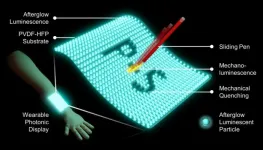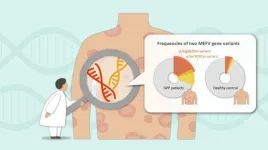(Press-News.org) In a study published in Cell on March 5, Prof. ZHANG Xiaoming at the Shanghai Institute of Immunity and Infection (SIII) of the Chinese Academy of Sciences and Profs. GAO Qiang, FAN Jia and YANG Li at Fudan University have uncovered an unexpected level of complexity hidden within neutrophils, which were previously thought to be a relatively uniform population of short-lived immune cells.
Using cutting-edge single-cell RNA sequencing technology, the researchers analyzed individual neutrophils across a remarkable 17 different cancer types from 143 patients. They revealed that neutrophils can adopt at least 10 highly specialized and distinct functional states related to inflammation, blood vessel formation, and—most excitingly—presenting antigens to activate potent cancer-killing T cells.
"We were surprised to find such intricate complexity and divergent roles embedded within neutrophils, which have been overlooked for so long as a simple population," said Prof. ZHANG. "What is especially remarkable is their newly discovered capacity to act as antigen-presenting cells, maturing and rallying T cells against cancer. In addition, the abundance of antigen-presenting neutrophils is associated with improved patient prognosis across many tumor types revealed in this study."
Through extensive analysis, the researchers determined that this antigen-presenting state can be switched on through metabolic signaling of the amino acid leucine and ensuing epigenetic changes. “We've uncovered a way to wake up an untapped army already living within our immune system. Strategically activating these neutrophil states or modulating their behavior through metabolic or dietary means represents an entirely new paradigm to empower cancer immunotherapy,” said Prof. ZHANG.
The researchers then validated the therapeutic potential of these findings through in vivo models. They found that delivering antigen-presenting neutrophils or simply modulating the leucine diet dramatically boosted the anti-tumor immune response in mice, and the treatments also markedly improved outcomes of PD-1 checkpoint immunotherapy across a range of cancer types.
"This completely changes how we perceive neutrophils in the context of cancer," said Prof. GAO. "Now we know we could harness the diverse hidden identities of neutrophils to strengthen the effectiveness of immunotherapies. We're thrilled to further explore the potential benefits of these newly uncovered mechanisms in clinics."
This study underscores the value of single-cell sequencing approaches to reveal new functional dimensions even within seemingly well-understood immune cells. Tapping into the hidden potential of neutrophils may provide new insights into cancer diagnosis and treatment.
END
Researchers discover new cancer-fighting role for neutrophils
2024-03-07
ELSE PRESS RELEASES FROM THIS DATE:
Personality and mental health factors linked to vaping uptake
2024-03-07
University of Otago researchers have discovered three psychological factors that predict if a non-smoker will start vaping.
The study, published in the journal Drug and Alcohol Review, investigates how psychological traits related to personality and mental health predict the likelihood of vaping uptake over time in non-smoking adults.
Researchers, led by Professor Tamlin Conner of the Department of Psychology and Andre Mason of the Department of Psychological Medicine, analysed longitudinal data of more than 36,000 New Zealand adults from the New Zealand Attitudes and Values Study (NZAVS).
They found people who ...
Powerless mechanoluminescent touchscreen underwater
2024-03-07
Optical properties of afterglow luminescent particles (ALPs) in mechanoluminescence (ML) and mechanical quenching (MQ) have attracted great attention for diverse technological applications. Recently, a team of researchers from Pohang University of Science and Technology (POSTECH) has garnered attention by developing an optical display technology with ALPs enabling the writing and erasure of messages underwater.
The team, comprised of Professor Sei Kwang Hahn and PhD candidate Seong-Jong Kim from the Department of Materials Science and Engineering at the POSTECH, uncovered a distinctive optical phenomenon in ALPs. Subsequently, they successfully created ...
Missing disease-related gene identified in generalized pustular psoriasis
2024-03-07
A team from Nagoya University in Japan has identified previously unidentified gene variants that are associated with the development of generalized pustular psoriasis (GPP). The team’s findings, published in the Journal of the American Academy of Dermatology, offer hope for improving diagnosis and therapy.
GPP is rare, but its effects are often serious. People with GPP can experience recurrent flares of the disease, which include multiple erythematous lesions and sterile pustules over the whole body, often accompanied by fever ...
Schisanhenol: A potential drug for the treatment of cytokine storm
2024-03-07
Background and objectives
Cytokine storm (CS) is an acute systemic inflammatory response with limited effective interventions up to now. The treatment experience of the COVID-19 pandemic suggests great potential in the intervention of CS by herbal medicine. This study aimed to investigate whether Schisanhenol (SSH), an active component of the Chinese herbal medicine Schisandra chinensis, has the potential to interfere with CS.
Methods
The effect of SSH on nuclear factor-kappa B (NF-κB) signaling pathway activity ...
Revealing a hidden threat: Researchers show viral infections pose early heart risks
2024-03-07
In a potentially game-changing development, scientists with the Fralin Biomedical Research Institute at VTC have revealed a new understanding of sometimes fatal viral infections that affect the heart.
Traditionally, the focus has been on heart inflammation known as myocarditis, which is often triggered by the body’s immune response to a viral infection.
However, a new study led by James Smyth, associate professor at the Fralin Biomedical Research Institute, sheds new light on this notion, revealing that the virus itself creates potentially dangerous conditions in the heart ...
Study reveals unexpected literacy in autistic people who cannot speak
2024-03-06
About one-third of autistic people are unable to communicate using speech, and most are never provided an effective alternative. However, a new study from scientists at the University of Virginia suggests that many of these individuals are literate, raising the possibility that they could learn to express themselves through writing.
The study published in the journal Autism, reports that five times more nonspeaking autistic teenagers and adults demonstrated knowledge of written language conventions than would be expected from previous estimates of their abilities. The finding has important implications for the millions of autistic ...
The sweet stuff: How insects tell sugars apart
2024-03-06
New Haven, Conn. — Whereas humans have one receptor on their tongues that can detect all sorts of sweet things, from real sugar to artificial sweeteners like aspartame, insects have many receptors that each detect specific types of sugars. Yale researchers have now uncovered one way insect receptors are able to be so selective, an insight they say will help us understand how animals decipher the chemical world and how we might mimic that ability in the future.
They reported their findings in a study published March 6 in Nature.
Sugar is important to animals ...
What are Hubble and Webb observing right now? NASA tool has the answer
2024-03-06
It’s not hard to find out what NASA’s Hubble and James Webb space telescopes have observed in the past. Barely a week goes by without news of a cosmic discovery made possible using images, spectra, and other data captured by NASA’s prolific astronomical observatories.
But what are Hubble and Webb looking at right this minute? A shadowy pillar harboring nascent stars? A pair of colliding galaxies? The atmosphere of a distant planet? Galactic light, stretched and distorted on a 13-billion-year journey across ...
Medical malpractice incidents are more severe during daylight saving time
2024-03-06
DARIEN, IL – Medical malpractice incidents are more severe during the months of the year when daylight saving time is observed in the U.S., according to a new study that examined three decades of malpractice claims.
Results show that both medical malpractice incident severity and payment decisions were higher during the months of daylight saving time compared with the months of standard time, after controlling for whether states observe daylight saving time. Payment decisions also were higher, but medical incidents were not more severe, during the one week following the spring transition to daylight saving time.
“The spring daylight saving shift ...
Airflow dynamics scrub classroom air
2024-03-06
If you’ve ever wondered why some folks never catch the office or school cold, where they’re sitting might be keeping them from the path of pathogens, according to new UBC Okanagan research.
Using a working UBCO classroom as their test lab, the team found that accounting for airflow dynamics reduced pathogens in the classroom by 85 per cent.
“During the COVID-19 pandemic, the advice was often just to increase ventilation to the maximum,” says Mojtaba Zabihi, a doctoral student in mechanical engineering ...





